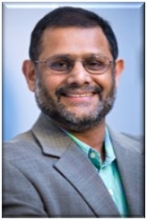EECS Seminar: Machine Learning Systems - Low-energy VLSI Architectures and Applications

Distinguished McKnight University Professor
Edgar F. Johnson Professor of Electronic Communication
Department of Electrical & Computer Engineering
University of Minnesota, Minneapolis
Abstract: Machine learning and data analytics continue to expand the fourth industrial revolution and affect many aspects of our lives. This talk will explore machine learning applications in data-driven neuroscience and low-energy implementations of machine learning systems. Data-driven neuroscience can exploit machine learning approaches including deep learning to generate hypotheses associated with biomarkers for specific neuropsychiatric disorders. In the first part, I will talk about use of machine learning to find biomarkers for epilepsy and adolescent mental disorders such as borderline personality disorder (BPD) using electroencephalogram (EEG) and functional magnetic resonance imaging (fMRI), respectively. In the second part of the talk, I will talk about approaches for energy-efficient implementations for both traditional machine learning and deep-learning systems. I will talk about the roles of feature ranking and incremental-precision approaches to reduce energy consumption of traditional machine learning systems. I will conclude with our recent work on Perm-DNN based on permuted-diagonal interconnections in deep convolutional neural networks and how structured sparsity can reduce energy consumption associated with memory access in these systems.
Bio: Keshab K. Parhi received the B.Tech. degree from the Indian Institute of Technology, Kharagpur, in 1982, the M.S.E.E. degree from the University of Pennsylvania in 1984, and a Ph.D. degree from the University of California, Berkeley, in 1988. He has been with the University of Minnesota, Minneapolis, since 1988, where he is currently the Distinguished McKnight University Professor and Edgar F. Johnson Professor of electronic communication in the Department of Electrical and Computer Engineering. Parhi has published over 600 papers, is the inventor of 29 patents, and has authored the textbook VLSI Digital Signal Processing Systems (Wiley, 1999) and coedited the reference book Digital Signal Processing for Multimedia Systems (Marcel Dekker, 1999). His current research addresses VLSI architecture design of machine-learning systems, hardware security, data-driven neuroscience and molecular/DNA computing. Parhi is the recipient of numerous awards including the 2017 Mac Van Valkenburg award and the 2012 Charles A. Desoer Technical Achievement award from the IEEE Circuits and Systems Society, the 2004 F. E. Terman award from the American Society of Engineering Education, the 2003 IEEE Kiyo Tomiyasu Technical Field Award, the 2001 IEEE W. R. G. Baker prize paper award, and a Golden Jubilee medal from the IEEE Circuits and Systems Society in 2000. He served as the editor-in-chief of the IEEE Trans. Circuits and Systems, Part-I during 2004 and 2005. He was elected a fellow of IEEE in 1996 and a fellow of the American Association for Advancement of Science (AAAS) in 2017.
Share
Upcoming Events
-
MSE 298 Seminar: Quasi-1D/2D Charge-Density-Wave Materials - From Exotic Physics to Application Prospects
-
EECS Seminar: Steering Diffusion Models for Generative AI, From Multimodal Priors to Test-Time Scaling
-
CBE 298 Seminar: Finding Catalysts of Gut Reactions - The Gut Microbiota in Disease Onset and Treatment
-
CEE Seminar: Confirming a Critical Foundation of Global Warming - Direct Observational Evidence from Space of the Impact of CO2 Growth on Infrared Spectra
-
MSE 298 Seminar: Basic Materials Science Aspects In Sustainable Metallurgy
